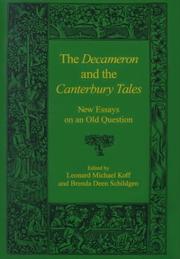| Listing 1 - 7 of 7 |
Sort by
|
Book
ISBN: 0520059999 Year: 1988 Publisher: Berkeley : University of California Press,
Abstract | Keywords | Export | Availability | Bookmark
 Loading...
Loading...Choose an application
- Reference Manager
- EndNote
- RefWorks (Direct export to RefWorks)
CHAUCER (GEOFFREY), d. 1400 --- CANTERBURY TALES --- TECHNIQUE
Book
Year: 1988 Publisher: Berkeley Los Angeles London University of California Press
Abstract | Keywords | Export | Availability | Bookmark
 Loading...
Loading...Choose an application
- Reference Manager
- EndNote
- RefWorks (Direct export to RefWorks)
Book
ISBN: 9789004212459 9004212450 9786613356758 1283356759 9004216820 9789004216822 Year: 2012 Publisher: Leiden ; Boston : Brill,
Abstract | Keywords | Export | Availability | Bookmark
 Loading...
Loading...Choose an application
- Reference Manager
- EndNote
- RefWorks (Direct export to RefWorks)
The topic of mobs has resonances in a remarkable number of disciplines and provides a link between past and present—mobs are clearly of much importance today. The idea of mobs provides the context for all the essays and topics in this volume — from Heraclitus to the writings of Elias Canetti to the notion of internet mobs. The essays here speak to the complex nature of the mob: its defining characteristics and the varying consequences of its behavior. Mobs as a book brings wide-ranging clarity to a topic that touches such disciplines as medieval studies, literature, musicology, theology and philosophy, history, social theory, the development of the early university, and theatre. Contributors are (in order within the volume): Leonard M. Koff, Ben Schomakers, Bernard S. Bachrach, Nancy van Deusen, Paul W. Knoll, Charlotte Bauer, Andrew Galloway, Robert W. Hanning, Terence Tunberg, Peter Howard, Cornelia Oefelein, Teofilo Ruiz, Richard Taruskin, David B. Rosen, Aino Paasonen and Richard Sogliuzzo.
Mobs --- Crowds --- Rassemblements --- Foules --- History --- Histoire --- E-books --- Riots --- History. --- Europe. --- Council of Europe countries --- Eastern Hemisphere --- Eurasia
Book
ISBN: 9004312315 9789004312319 9789004310025 9004310029 Year: 2016 Publisher: Leiden
Abstract | Keywords | Export | Availability | Bookmark
 Loading...
Loading...Choose an application
- Reference Manager
- EndNote
- RefWorks (Direct export to RefWorks)
The essays in this volume explore the nature of time, our God-given medium of ascent, known, as Augustine puts it, through the ordered study of the “liberal disciplines that carry the mind to the divine ( disciplinae liberales intellectum efferunt ad divina )”: grammar and dialectic, for example, to promote thinking; geometry and astronomy to grasp the dimensions of our reality; music, an invisible substance like time itself, as an exemplary bridge to the unseen substance of thoughts, ideas, and the nature of God (theology). This ascending course of study rests on procedure, progress, and attainment — on before, following, and afterwards — whose goal is an ascending erudition that lets us finally contemplate, as Augustine says in De ordine , our invisible medium — time — within time itself: time is immaterial, but experienced as substantial. The essays here look at projects that chronicle time “from the beginning,” that clarify ideas of creation “in time” and “simultaneous times,” and the interrelationships between measured time and eternity, including “no-time.” Essays also examine time as revealed in social and political contexts, as told by clocks, as notated in music and embodied in memorializing stone. In the final essays of this volume, time is understood as the subject and medium of consciousness. As Adrian Bardon says, “time is not so much a ‘what’ as a ‘how’” : a solution to “organizing experience and modeling events.” Contributors are (in order within the volume) Jesse W. Torgerson, Ken A. Grant, Danielle B. Joyner, Nancy van Deusen, Peter Casarella, Aaron Canty, Jordan Kirk, Vera von der Osten-Sacken, Gerhard Jaritz, Jason Aleksander, Sara E. Melzer, Mark Howard, Andrew Eschelbacher, Hans J. Rindisbacher, James F. Knapp, Peggy A. Knapp, Raymond Knapp, Michael Cole, Ike Kamphof and Leonard Michael Koff.
Time --- Time perception. --- Space and time. --- Chronology. --- Time in literature. --- Philosophy. --- History. --- Social aspects. --- Political aspects.

ISBN: 0838638007 Year: 2000 Publisher: Cranbury, NJ : Fairleigh Dickinson University Press,
Abstract | Keywords | Export | Availability | Bookmark
 Loading...
Loading...Choose an application
- Reference Manager
- EndNote
- RefWorks (Direct export to RefWorks)
CHAUCER (GEOFFREY), d. 1400 --- CHRISTIAN PILGRIMS AND PILGRIMAGES IN LITERATURE --- BOCCACCIO (GIOVANNI), 1313-1375 --- MEDIEVAL TALES --- ENGLISH POETRY --- CANTERBURY TALES --- DECAMERONE --- INFLUENCE --- HISTORY AND CRITICISM --- ITALIAN INFLUENCES
Book

ISBN: 9783110599626 Year: 2020 Publisher: Berlin Boston
Abstract | Keywords | Export | Availability | Bookmark
 Loading...
Loading...Choose an application
- Reference Manager
- EndNote
- RefWorks (Direct export to RefWorks)
Digital

ISBN: 9783110599626 9783110598858 9783110596892 Year: 2020 Publisher: Berlin ;; Boston De Gruyter
Abstract | Keywords | Export | Availability | Bookmark
 Loading...
Loading...Choose an application
- Reference Manager
- EndNote
- RefWorks (Direct export to RefWorks)
| Listing 1 - 7 of 7 |
Sort by
|

 Search
Search Feedback
Feedback About UniCat
About UniCat  Help
Help News
News